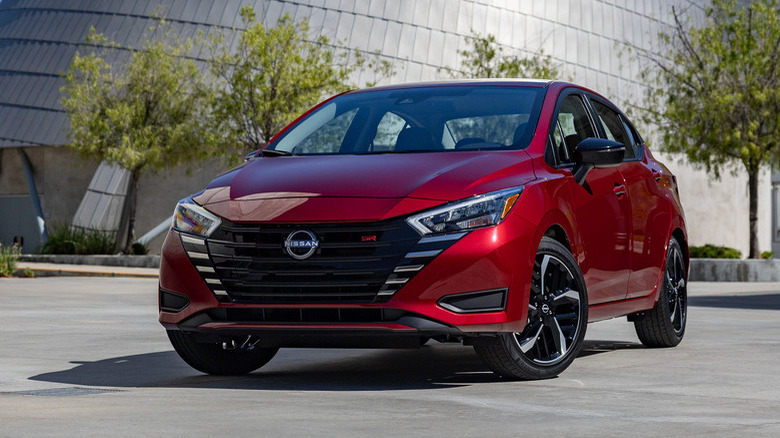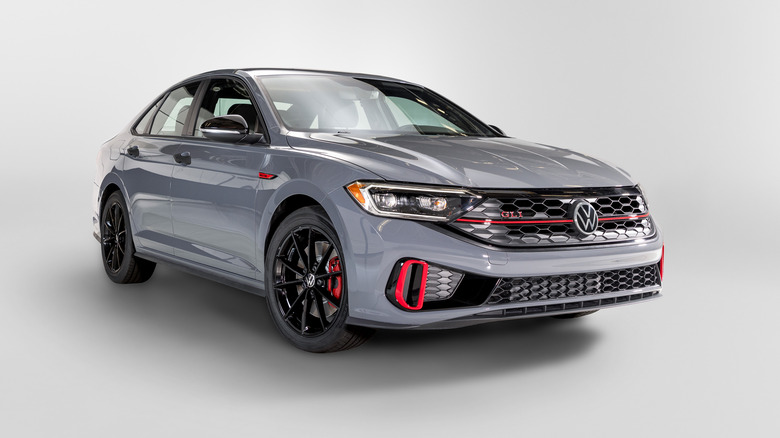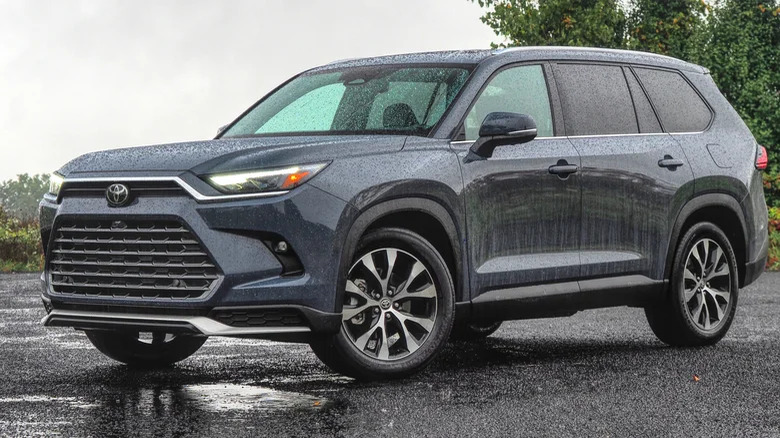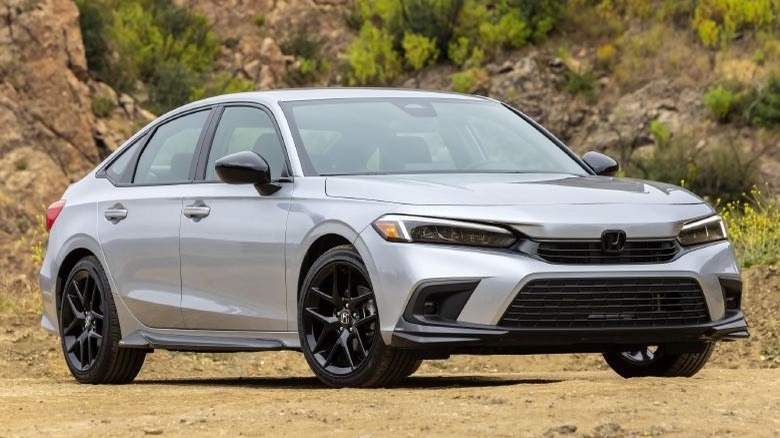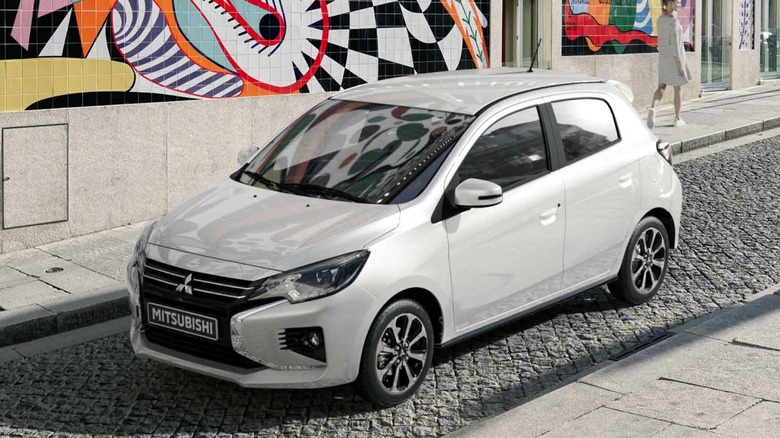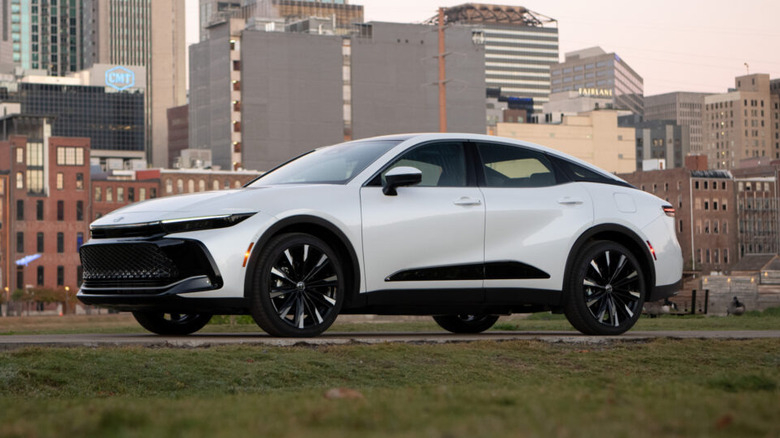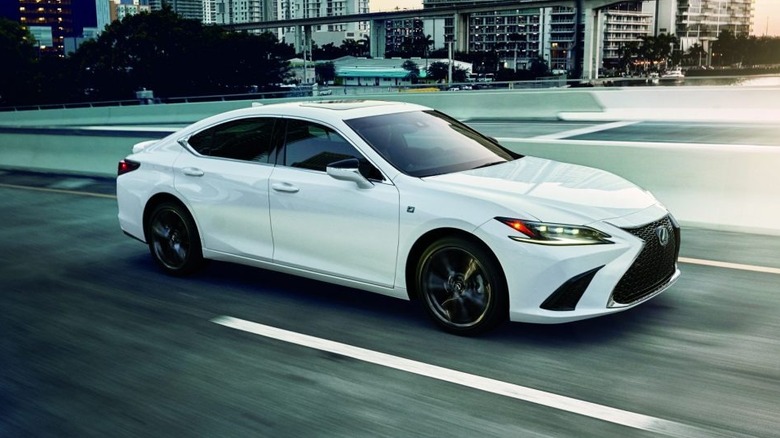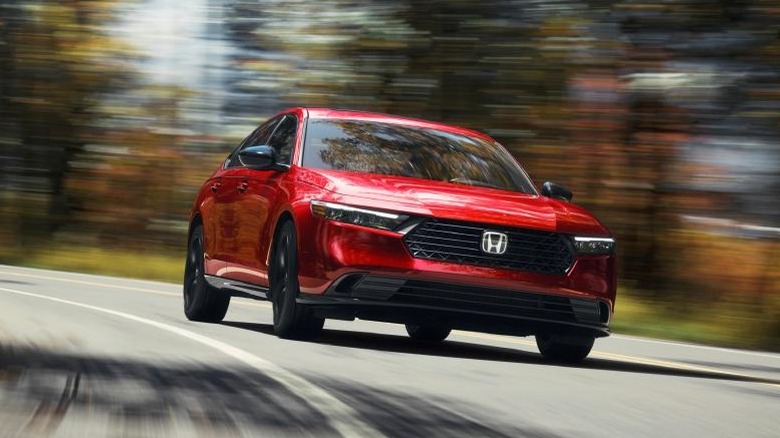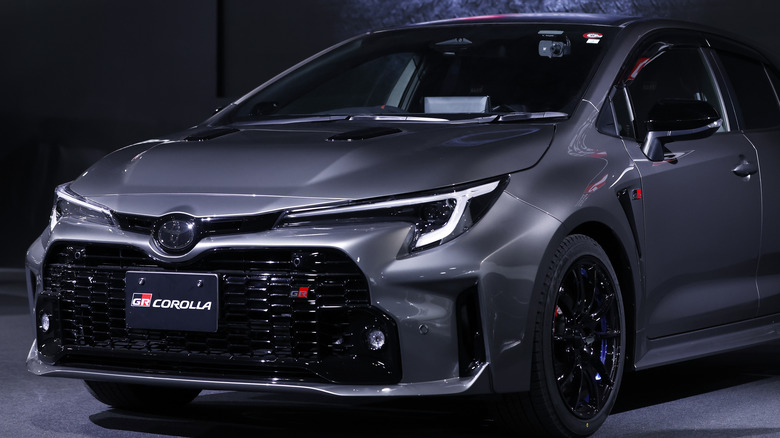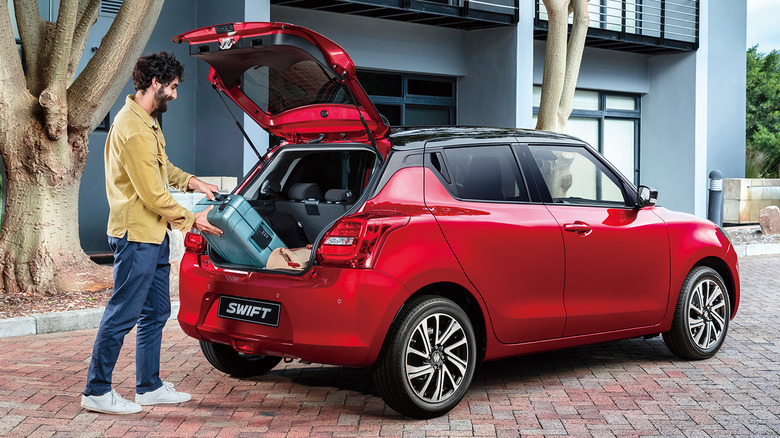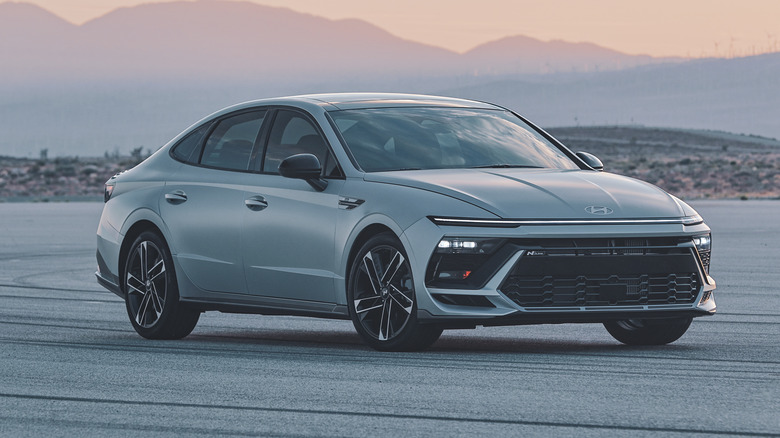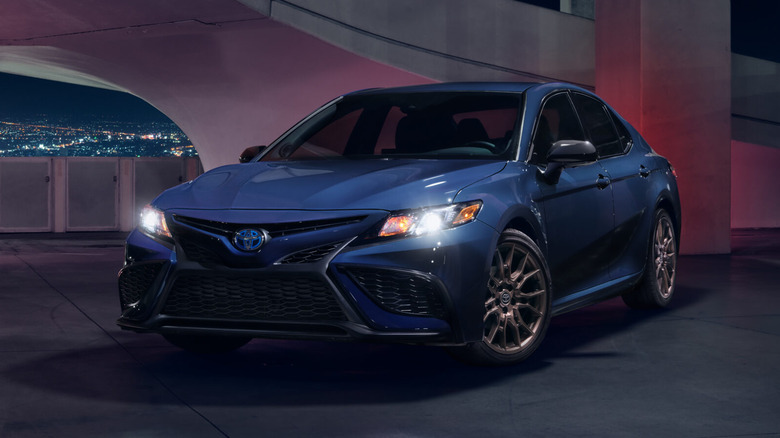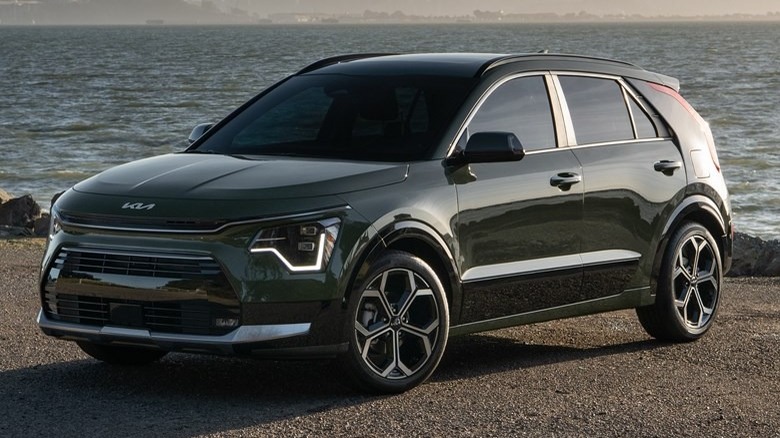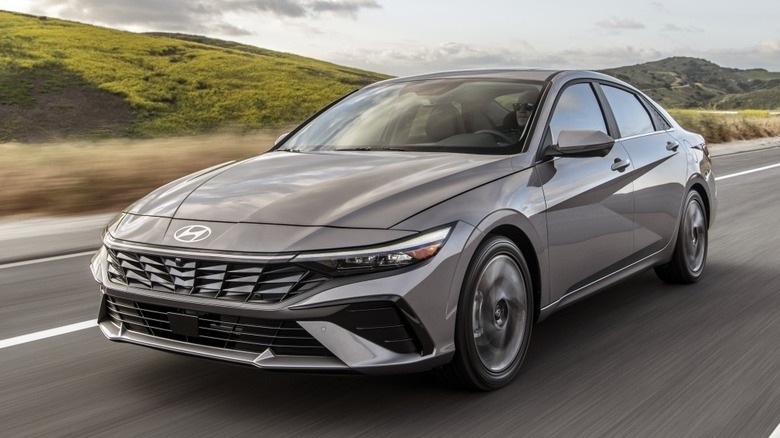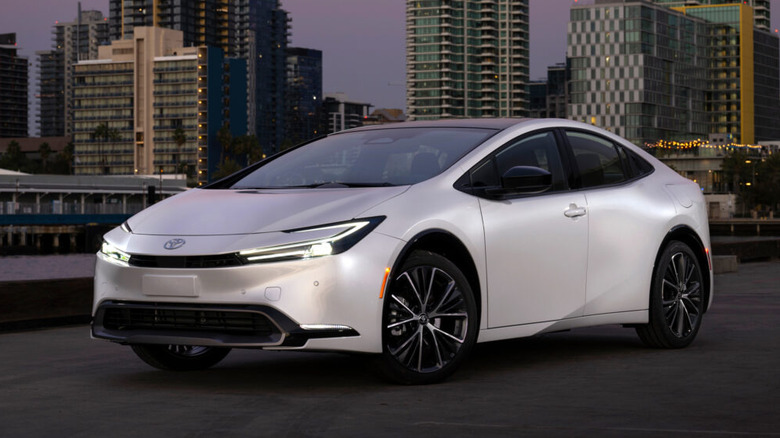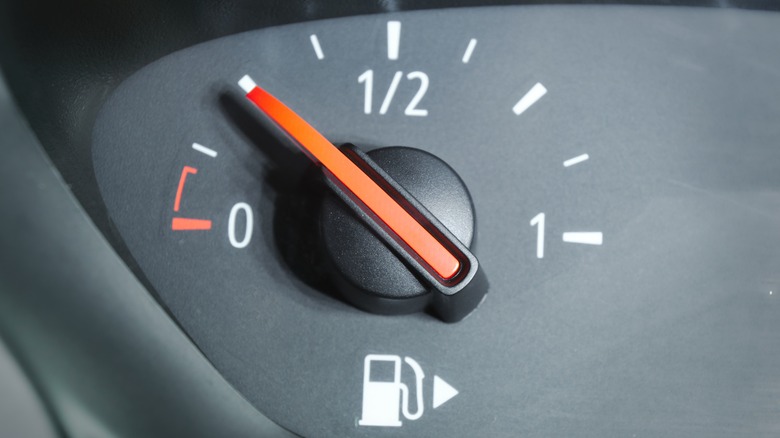The 15 Most Fuel Efficient Cars You Can Buy In 2024
With gas prices still higher than many people would like, and the climate changing at a less-than-desirable rate, fuel economy is a major concern to those looking to purchase a new vehicle. You can of course go electric, but that will take some time to pay off in environmental terms and has some practical considerations. Many people opt for a hybrid, while some are still attached to ICE vehicles. The good news is, they don't have to be gas guzzlers. To help you pick your best option, we've developed a list of the most economical new vehicles you can buy in 2024.
There are some rules to be followed for these annual lists. One of them relates to plug-in hybrids. While some vehicles we list may have a PHEV version, the plugin doesn't factor in our overall rankings. This is partly because people with the occasional short commute could just use it as an EV, giving it a far greater MPG rating than it would have otherwise.
It's also worth noting that this list only contains vehicles with a 2024 model year, and the most economical car you can buy is still last year's Hyundai Ioniq. Nothing released in 2024 has managed to knock it off its low emissions throne.
15. Nissan Versa
Cheap, fuel-efficient, subcompacts are a dying breed, and that's a pretty sad thing. While the likes of the much-loved Mitsubishi Mirage are soon to be a hazy illusion in the distance, Nissan is still clinging to its subcompact. The Versa has a 2024 model and is still ridiculously economical for something without a hybrid powertrain. In the city, the Versa will clock around 32 MPG. This increases to 40 MPG on the highway, averaging out at a combined 35 MPG in total. The highway efficiency is particularly impressive, and if we were judging this list on best-case scenario MPG, the Versa would place a lot higher.
While environmental concerns are entirely valid, a lot of the interest in fuel economy is purely financial. Because of this, we should also take the little Nissan's MSRP into account. You can nab one for just over $16,000, making it one of the cheaper vehicles on the list. While some other models may have slightly better fuel economy, it will take a long time for that difference to pay for itself. If you can cope with having a tiny ride, then the Versa is a very solid choice.
14. VW Jetta
The Jetta has been one of Volkswagen's more popular vehicles for a while now. It first hit the road in the late 70s, and has retained the same core concepts ever since. It's reasonably sized, reliable, and won't financially cripple you at the gas pump. While it's not a large car, it's not exactly a sub-compact either. It shares a platform with the Audi A4, which is one of the better options when it comes to small sedans.
The VW Jetta is joint 13th on our list, with a combined 35 MPG. It isn't outlandishly economical in the city, coming in at 29 MPG, but it more than makes up for that on the highway. Take this out on the open road, and you can cruise along at 42 MPG all day long. It's a solid showing for a "full-sized" car without a hybrid powertrain, and an obvious choice for someone who wants a more traditional method of transport while saving as much cash as possible when it comes to refueling.
13. Toyota Grand Highlander Hybrid
Sometimes a crossover won't cut it and you need a mid-sized three-row SUV. You can still get that without really compromising on fuel economy, but that does limit your choice to very few vehicles, one of which is the 2024 Toyota Grand Highlander Hybrid. Despite its larger size, the Highlander Hybrid achieves a respectable 35 MPG combined. That may be significantly less than some of the ultra-efficient hybrids higher up on our list, but it's amazing when compared to most vehicles in general. Yes, the hybrid powertrain means it's not a direct comparison, but 35 MPG makes many regular sedans and even some compacts look like gas guzzlers in comparison. And this has three rows of seats in it.
In terms of downsides, like many other modern SUVs the pricing seems to be erring towards the premium. The non-hybrid basic version starts at over $43,000 and you could be paying around $60,000 if you go all out and tack a destination fee on top of it. Still, this is quite possibly the largest and most practical vehicle on the list.
12. Honda Civic
Despite ditching its hybrid variant a while ago, the Honda Civic is still a shockingly economical car. The Japanese compact gets an impressive 36 MPG combined, which breaks down into a very economical 42 MPG on a motorway and a still impressive 33 MPG in the city. This all seems even more shocking when you consider that the vehicle isn't powered by some one-liter hairdryer, but has a two-liter engine capable of churning out 158 horsepower under its hood instead.
This time next year, you may see the Honda Civic a lot further up the list. The Japanese manufacturer has announced that it will be bringing back the hybrid version of the Civic for the 2025 model year. Those vehicles will start to roll out late in 2024, and we should have estimates on just how economical they are within the next few months. As things stand, however, it's all one for the future.
11. Mitsubishi Mirage
At 39 MPG combined, the Mitsubishi Mirage just misses out on a top-10 spot in our list of economical vehicles. The little Japanese car, which placed well in the 2023 and 2022 lists, gets a very respectable 36 MPG in a city and can stretch out to 43 MPG on the highway. This makes it a class leader in terms of fuel economy, and pushes it well ahead of the popular Kia Rio. However, this victory isn't enough to save the little Japanese hatchback.
Although it tends to place well on our fuel economy lists, the Mirage is set to disappear in 2025 — at least when it comes to North America. Mitsubishi is choosing to discontinue this economical little number in a country where compacts have never really sold that well anyway. So in a way, you're getting a little piece of history if you snag a 2024 Mirage. It's also yet another indication that the 2025 list will have yet more hybrids and shockingly few combustion-engined cars as more companies opt to add an electric element and smaller, more efficient combustion engines continue to go the way of the dinosaurs.
10. Toyota Crown
After recently making a comeback in the United States, the Toyota Crown has carved out a solid niche for itself. Sitting somewhere between a midsize and large sedan, while incorporating several SUV-like elements, the Crown is seen as a solid choice by those who want a larger vehicle but are put off by trucks and traditional SUVs. Add in a few luxury touches, and you get what is widely considered to be one of the best hybrids currently on the market. In terms of fuel economy, which is what we're all here for, the Crown gets 41 MPG on the highway and 42 MPG in the city. This rounds up to a total of 42 MPG combined, but it doesn't apply to every crown. As with previous years, the "Platinum" model features a more powerful engine and takes a significant hit to fuel economy as a result.
If you were sitting around and waiting for the crown to go full crossover, there's some good news on the way. The Toyota Crown Signia is set to launch next year, and is set to give those looking for a premium hybrid crossover yet another option.
9. 2024 Lexus ES 300h
If you want a spot of luxury in your life, but are still concerned about how much you're going to pay at the pump, then it's probably time to consider a Lexus. Yes, there are various other economical vehicles with lots of luxury touches these days, but Lexus has placed better than any other dedicated luxury brand in our 2024 list of economical vehicles — and it's done that with a hybrid sedan.
The 2024 Lexus ES gets 44 MPG combined, and that translates almost exactly to its performance in the city and on the highway. Going between towns, it will do up to 44 according to the EPA, while it will lose roughly one MPG in an urban environment with an estimated 43 MPG in the city. So if you need all-around consistency to go with that luxury, the ES 300h is the way forward. It is worth noting that non-hybrid variants of the ES suffer from significantly worse fuel economy, so you will have to stump up for the hybrid option if gas prices are a constant cause of anxiety.
8. Honda Accord Hybrid
Honda's EV roadmap features some hefty electrification plans that are likely to come to fruition over the next few years. However, they aren't abandoning gasoline just yet. Some vehicles in the Japanese company's lineup show that you don't have to go electric to stay somewhat green, and one of them is the Honda Accord Hybrid. The hybrid variant of the popular sedan can clock an impressive 48 mpg combined according to the EPA, which means that even when gas prices are irritatingly high, your bank balance won't take too much of a hit.
The MPG estimates split up into 51 MPG in the city and 44 MPG on the highway. So no matter where you drive the Accord, you should get plenty of mileage from your tank. However, it is noticeably better suited to driving through an urban environment than it is out on the open road. As with many other hybrids on this list, there is a major dropoff when you pick a non-hybrid trim, and the annual savings on gas can be notable. Splashing out on the Accord's hybrid powertrain may cost more at the dealership, but there's a good chance you'll have saved some money by the time you sell the car.
7. Toyota Corolla Hybrid
The Toyota Corolla has been around for decades, and the 2024 hybrid version is both well-equipped, affordable, and incredibly economical. It gets 50 MPG combined, which is propped up by its 53 MPG average when driving in the city. The highway side of things may let the Corolla down somewhat, coming in at 46 MPG, so Toyota's little hybrid may be one for the urbanites. Fuel economy has also improved a little since last year, when the Corolla hybrid pulled in 47 MPG combined.
While it isn't as accomplished as the Prius and other vehicles higher up in Toyota's range, it is still a very solid hybrid from the company that has frankly dominated the hybrid market for over 20 years. Downsides include the fact it's a tight squeeze in the back and has an underwhelming look. However, it could still be the right pick for you should your circumstances align with its strong point. On the fuel economy front, it's firmly in the middle of our pack.
6. Suzuki Swift
If subcompacts are your thing, then you'll struggle to do better than the 2024 Suzuki Swift. The tiny Japanese car is powered by an equally tiny, 1.3-liter, three-cylinder, engine which is available as a mild hybrid. That configuration will boost the tiny, aerodynamic, vehicle's fuel economy up to a very impressive 50 MPG.
The 2024 Swift was unveiled in Japan in late 2023, with an early 2024 release date announced at the same time. It is worth noting that the Swift tends to be geared towards the European market instead of the U.S. one, so you may not spot one stateside. Pricing tends to sit somewhere around the $20,000 mark. Despite the vehicle's small size, you can't expect much of its tiny engine either. Reported 0-60 times are anywhere up to 13.2 seconds, which wasn't great back in the day and seems entirely pedestrian now electric vehicles have torn up the acceleration rule book.
5. Hyundai Sonata Hybrid
The Hyundai Sonata Hybrid drops down a couple of spots after nabbing bronze in our 2023 list, but it's still a great choice for anyone looking for an economical family sedan. It averages out at 52 MPG, with that breaking down to 50 MPG when moving through the city and an impressive 54 MPG on the highway. It's worth noting that this is the same combined, highway, and city fuel economy estimates that the 2023 model offered — so if fuel economy is your main concern snagging a slightly older model at a discount price won't affect that at all.
As for reasons to tempt yourself away from some of the more economical sedans on our list, the 2024 Sontana has had a bit of a redesign and is currently one of the sharper-looking sedans in its price tier. Its looks, which have been rejigged both inside and out, bring it a bit closer to Hyundai's Ioniq line of EVs in terms of appearance.
4. Toyota Camry Hybrid
Sharing fourth place with the Hyundai Sontana is the 2024 Toyota Camry (or, the hybrid version of it anyway). This year's Camry boasts an impressive 52 MPG, which breaks down into 51 MPG in the city and 53 on a highway. The mileage varies by trim, and if you opt against the hybrid variant it could suffer significantly. Some of this year's ICE-only Camry hybrids can have a fuel economy as low as 25 MPG. While not bad historically, it's less than half of what you get with the hybrid variant.
While the non-hybrid version of the Camry is far less economical, it's still an option in 2024. This is going to change next year, when the Japanese automaker goes all-in on hybrid with the 2025 model. If this year, and previous versions, are anything to go by, that Camry will also be on our list, though its exact ranking remains to be seen.
3. Kia Niro
Kia may be shifting more and more focus towards EVs these days, but that shouldn't draw attention from the fact that the Korean company still produces the most economical hybrid crossover on the market in the Niro FE. The Kia Niro gets 53 MPG combined, which breaks down into 53 MPG city and 54 MPG highway.
It's also pretty cheap as far as new vehicles go, with the LE trim costing just shy of $27,000. Conveniently, the basic trim is also the most fuel-efficient, if that's your main concern. At the other end of the spectrum, the SX Touring version is priced at $35,340 which isn't dirt cheap but is still on the low end for a crossover with its most expensive package attached. A crossover placing so high on the list is impressive in itself, as it may be worth trading a small amount of fuel economy for the increased space and other benefits that come with the platform. However, if fuel economy is everything to you, read on.
2. Hyundai Elantra Hybrid
With a combined MPG of 54, the Hyundai Elantra Hybrid finds itself second on our list. Fuel economy varies between the 2024 Elantra's trims, and it's actually the Hybrid Blue that boasts 51 MPG in the city and 58 on the highway.
While the Hyundai Elantra Hybrid Blue finds itself second overall, it's the most economical vehicle on this list when it comes to highway driving. Because of this, you should probably go for this fuel-friendly sedan if you do a lot of long-distance traveling between cities, and less urban maneuvering. With that being said, the difference between the top spots on our list isn't that drastic, with just a few miles per gallon between each choice. Your style of driving, as well as the weight you're carrying, will likely make as big an impact on your fuel economy as one or two spots on this list will.
1. Toyota Prius
After being there or thereabouts for the past few years, the Toyota Prius has finally nabbed the top spot on our annual list of most economical cars. According to fueleconomy.gov, one variant of the Prius can manage a staggering 57 MPH in the city, with highway driving not far behind at 56 MPG. This rounds up to 57 MPG combined, though actual results may vary based on your individual use and driving style.
The biggest improvement in recent times is the highway mileage, which has improved by three MPG since the 2022 model was launched. Many hybrids tend to "suffer" on highways as their batteries fail to benefit from things like regenerative braking when the vehicle is moving along at a constant rate.
For those who want to push things to the extreme, a PHEV version is available in the form of the Toyota Prius Prime. That will set you back just shy of $33,000 while the basic Prius (with its 57 MPG fuel economy) is available from $27,950.
How we compiled this list
To compile this list we used EPA estimates of the vehicle's combined miles per gallon (MPG) rating. This rating is an average of a vehicle's MPG in a city and on the highway, and as a result, some vehicles on the list may perform better in one of those categories than cars higher up. The stats used were either pulled from the manufacturer's website or The U.S Department of Energy's fuel economy website.
It's worth noting that the figures, while official, are only an estimate based on a series of standardized tests performed by the EPA. Actual fuel economy can vary based on several factors including driving style, average speed, amount of weight the vehicle is carrying, and even things like altitude. Electric vehicles and plug-in hybrids were excluded for many reasons, including the fact that the EPA tests and rates them separately from ICE cars and regular hybrids.
More information on the testing methods used by the EPA can be found at www.fueleconomy.gov.

